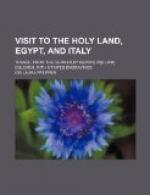I was told, that when the Greeks celebrate their Easter here, the ceremonies seldom conclude without much quarrelling and confusion. These irregularities are considerably increased when the Greek Easter happens to fall at the same time as that of the Roman Catholics. On these occasions, there are not only numerous broken heads, but some of the combatants are even frequently carried away dead. The Turks generally find it necessary to interfere, to restore peace and order among the Christians. What opinion can these nations, whom we call Infidels, have of us Christians, when they see with what hatred and virulence each sect of Christians pursues the other? When will this dishonourable bigotry cease?
On the third day after my arrival at Jerusalem, a small caravan of six or seven travellers, two gentlemen namely, and their attendants, applied for admittance at our convent. An arrival of this kind, particularly if the new-comers are Franks, is far too important to admit of our delaying the inquiry from what country the wanderers have arrived. How agreeably was I surprised, when Father Paul came to me with the intelligence that these gentlemen were both Austrian subjects. What a singular coincidence! So far from my native country, I was thus suddenly placed in the midst of my own people. Father Paul was a native of Vienna, and the two counts, Berchtold and Salm Reifferscheit, were Bohemian cavaliers.
As soon as I had completely recovered from the fatigues of my journey, and had collected my thoughts, I passed a whole night in the church of the Holy Sepulchre. I confessed in the afternoon, and afterwards joined the procession, which at four o’clock visits all the places rendered sacred by our Saviour’s passion; I carried a wax taper, the remains of which I afterwards took back with me into my native country, as a lasting memorial. This ceremony ended, the priests retired to their cells, and the few people who were present left the church. I alone stayed behind, as I intended to remain there all night. A solemn stillness reigned throughout the church; and now I was enabled to visit, uninterrupted and alone, all the sacred places, and to give myself wholly up to my meditations. Truly these were the most blissful hours of my life; and he who has lived to enjoy such hours has lived long enough.
A place near the organ was pointed out to me where I might enjoy a few hours of repose. An old Spanish woman, who lives like a nun, acts as guide to those who pass a night in the church.
At midnight the different services begin. The Greeks and Armenians beat and hammer upon pendent plates or rods of metal; the Roman Catholics play on the organ, and sing and pray aloud; while the priests of other religions likewise sing and shout. A great and inharmonious din is thus caused. I must confess that this midnight mass did not produce upon me the effect I had anticipated. The constant noise and multifarious ceremonies are calculated rather to disconcert than to inspire the stranger. I much preferred the peace and repose that reigned around, after the service had concluded, to all the pomp and circumstance attending it.




